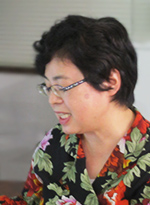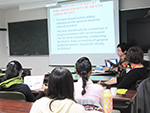 |
| Catherine Mills |
 |
| Azumi Tsuge |
 |
| Marcelo de Alcantara |
 |
The IGS Seminar “Choice and Consent in Prenatal Testing” was held on November 18, 2015 at Ochanomizu University. The main theme of the seminar was “Are decisions about prenatal testing by pregnant women truly their choice?” Pregnant women face decisions such as whether to undergo prenatal testing or whether to abort a fetus when tests results suggest disability. Dr. Catherine Mills (Monash University) and Dr. Azumi Tsuge (Meiji Gakuin University) gave presentations on issues related to prenatal testing based on their respective research in Australia and Japan. Responding to their presentations, Dr. Marcelo de Alcantara (Ochanomizu University) gave comments from his perspective as a legal researcher.
From the viewpoint of bioethics and feminism, Mills referred to the self-determination of pregnant women with regard to prenatal testing. Mills provided examples of ultrasonography practice in Australia and then explained the concepts of “normalizing” and “apparatus of choice.” Because people are greatly affected by their culture and social environment when making choices, prenatal testing may be associated with discrimination and bias against disability. Pregnant women often undergo ultrasonography without recognizing it as prenatal testing because it isn’t invasive. Since it was introduced, Non-invasive Prenatal Testing (NIPT) has been widely adopted in Australia because it requires only a blood sample from the pregnant woman and therefore places no burden on her or her fetus. Informed consent and counseling are required before NIPT, but such procedures are not required in the case of ultrasonography. Citing a book written by Foucault, Mills referred to the nature of bio-politics and disciplinary power since the 18th century. The basic concept of biopower is the socialization of reproductive power and reproductive activity in association with the pathologization of certain conditions for the maintenance and promotion of health and well-being of individuals and the society as a whole. Mills suggests that ultrasonography is a medical technology that promotes standardization and is an apparatus of choice that make pregnant women to choose to abort when a possible disability is detected. In other words, prenatal testing should work to enhance pregnant women’s autonomy based on their moral or ethical principles. However, in practice, testing without informed consent and counseling may lead to the elimination of disabled children because women’s decisions may be influenced by the widespread negative image of disability.
After Mills’ presentation, Tsuge introduced the current situation in Japan. Apart from ultrasonography, the number of practiced prenatal tests (such as amniocentesis) in Japan is significantly smaller than in other developed countries. According to Sato, a leading researcher of prenatal testing in Japan, the number of maternal serum marker tests performed in the U.S. is 167 times larger than in Japan and the number of amniocentesis tests performed in Germany is 10 times larger. A survey in 1999 reported that only 3% of all pregnant women received prenatal testing based on maternal serum markers in Japan. The Health and Welfare Ministry and gynecologists made a statement in 1999 that pregnant women did not necessarily need to be informed about maternal serum marker screening; their reasoning was that the test might result in an increase in abortions of fetuses with disabilities. NIPT was introduced in 2013 in Japan, but it is only available for pregnant women of age of 35 or older. Before NIPT was introduced, there was a controversy about whether it would result in increased “casual” abortions based on eugenic thinking, particularly for pregnant women in higher age groups. Of nearly 200,000 cases of abortion performed annually in Japan, probably only 1% to 2% can be ascribed to the results of prenatal testing. Only 0.6% of the 7700 NIPTs conducted since the test’s introduction in 2013 have given positive results. Based on these data, Tsuge raised doubts about the idea that testing would increase abortion. She also explained the history of prenatal testing in Japan. Although abortion has been prohibited by the Criminal Law, prenatal testing has been promoted in connection with eugenics and in association with the Eugenic Protection Act and the Maternal Protection Act.
Following the reports by the two speakers, De Alcantara gave comments from a legal perspective. Referring to two past cases in involving prenatal testing, he pointed out the possibility that physicians might suggest prenatal testing in order to preclude Wrongful Life lawsuits (filings for unwanted babies) in the future. The first case was brought in 1997 by a woman aged 39 and her husband in Kyoto who gave birth to a baby with Down syndrome. Even though the woman told the doctor of her desire to receive an amniotic fluid check in the 20th week of pregnancy due to anxiety about her age, the doctor refused to provide the test, saying that it was meaningless because the result would be obtained only in the 22nd week of pregnancy, when the option of abortion was no longer available. The doctor’s claims were accepted by the court, and the couple lost the case. In another lawsuit case heard by the European Court of Human Rights in 2011, a Polish woman who gave birth to a baby with Turner’s syndrome insisted that her individual and family rights to subsistence were impaired by giving birth to a disabled baby, which resulted from her doctor’s negligence in providing her with information regarding prenatal testing during the period when abortion was available. This case was initially taken initially to court in Poland and later went to the European Court of Human Rights, which upheld the woman’s claims, resulting in her victory. As these cases reveal, choices and decisions by women have been controlled socially by being linked with ideologies such as eugenics, even if childbirth and raising are personal matters.
IGS Project Research Fellow
Yukari Semba, Ph.D

